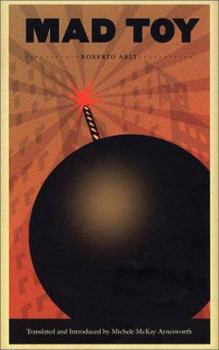Mad Toy
Select Format
Select Condition 
Book Overview
Roberto Arlt, celebrated in Argentina for his tragicomic, punch-in-the-jaw writing during the 1920s and 1930s, was a forerunner of Latin American "boom" and "postboom" novelists such as Gabriel Garc a M rquez and Isabel Allende. Mad Toy, acclaimed by many as Arlt's best novel, is set against the chaotic background of Buenos Aires in the early twentieth century. Set in the badlands of adolescence, where acts of theft and betrayal become metaphors for creativity, Mad Toy is equal parts pulp fiction, realism, detective story, expressionist drama, and creative memoir.
An immigrant son of a German father and an Italian mother, Arlt as a youth was a school dropout, poor and often hungry. In Mad Toy, he incorporates his personal experience into the lives of his characters. Published in 1926 as El juguete rabioso, the novel follows the adventures of Silvio Astier, a poverty-stricken and frustrated youth who is drawn to gangs and a life of petty crime. As Silvio struggles to bridge the gap between exuberant imagination and the sordid reality around him, he becomes fascinated with weapons, explosives, vandalism, and thievery, despite a desperate desire to rise above his origins. Flavored with a dash of romance, a hint of allegory, and a healthy dose of irony, the novel's language varies from the cultured idiom of the narrator to the dialects and street slang of the novel's many colorful characters.
Mad Toy has appeared in numerous Spanish editions and has been adapted for the stage and for film. It is the second of Arlt's novels to be translated into English.
An immigrant son of a German father and an Italian mother, Arlt as a youth was a school dropout, poor and often hungry. In Mad Toy, he incorporates his personal experience into the lives of his characters. Published in 1926 as El juguete rabioso, the novel follows the adventures of Silvio Astier, a poverty-stricken and frustrated youth who is drawn to gangs and a life of petty crime. As Silvio struggles to bridge the gap between exuberant imagination and the sordid reality around him, he becomes fascinated with weapons, explosives, vandalism, and thievery, despite a desperate desire to rise above his origins. Flavored with a dash of romance, a hint of allegory, and a healthy dose of irony, the novel's language varies from the cultured idiom of the narrator to the dialects and street slang of the novel's many colorful characters.
Mad Toy has appeared in numerous Spanish editions and has been adapted for the stage and for film. It is the second of Arlt's novels to be translated into English.
Format:Paperback
Language:English
ISBN:0822329409
ISBN13:9780822329404
Release Date:July 2002
Publisher:Duke University Press
Length:184 Pages
Weight:0.60 lbs.
Dimensions:0.5" x 5.5" x 9.2"
Customer Reviews
2 ratings
the avant-garde enters Latin America
Published by Thriftbooks.com User , 23 years ago
El juguete rabioso is the first novel that tried to infuse the avant-garde tendencies in the Latin-American prose and it does it with mixed results. Today the innovations of this novel seem terribly antiquated and cliché, like the utilisation of the street slang in the dialogues and attempts to describe the new urban culture. Its content also tries to touch taboo themes like masturbation and homosexuality, but it merely scratches at the surface. Its psychological approach is also lumpy, the internal monologues are still too tied to the traditional autobiographic form. Still many people like it, maybe because it has some reminiscences with the picaresque form, as it tells the story of a boy growing up in Buenos Aires, and the younger generation can identify with the protagonist's problem whether to succumb to the system or not. Like the picaresque novels, the story-line here is also a string of anecdotes, but it my opinion it is too fragmented, it leaves to many things unclear, jumps over too many details, not always telling what you want to hear. Maybe then it all seemed groundbreaking and it must have confused the literati as not many similar books followed its style. Still as many of the works of the different styles of the avant-garde in the literature, like the futurism or expressionism, contrary to its original intentions, it can still have some antiquated charm for some.
Madness, rage and Arlt
Published by Thriftbooks.com User , 24 years ago
The first novel of the great argentinian writer Roberto Arlt is like a bullet coming straight to your head. All the anger and envy that a human being can have is condensed here. Originally released at the late 20, it has not lost any of his incredible power. You can't expect less from the author of "Los siete locos". JUL






